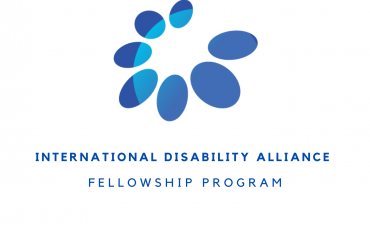Under the Catalyst Project, IDA newly started so-called ‘No One Left Behind’ grants, in order to support its global member organizations to engage in activities aimed at supporting the implementation and monitoring of the SDGs in compliance with the CRPD, in the Global South. These 50,000 USD grants are also meant to serve as seed money for members to secure additional funding, as was the case for WFDB (who succeeding in securing a grant from the Norwegian MoFA). All global IDA members started developing the concept of their NOLB grants, and four members started implementing the grant in 2017.
- International Federation of Spina Bifida and Hydrocephalus (IFSBH) - IFSBH NOLB grant in Nigeria aims to develop the skills and knowledge of children with Spina Bifida and Hydrocephalus and their families to participate in society, with a focus on the right to education.
- Inclusion International (II) - Through its NOLB grant, II is developing its ‘Empower Us’ initiative. The objectives are (1) to develop the global platform, methodology, and processes to be able to respond to the needs identified by member organizations in their advancement and strengthening of self-advocacy; (2) to identify and secure funding sources for the core structure of the mechanism and (3) to identify and secure funding for country-level initiatives.
- World Network of Users and Survivors of Psychiatry (WNUSP) - WNUSP NOLB grant focuses on strengthening the movement of persons with psychosocial disabilities and its advocacy, as one of the most marginalized groups among persons with disabilities. This includes opportunities for reviewing and defining advocacy strategies of the movement (including ensuring WNUSP representation in events such as the 5th Summit of the Movement for Global Mental Health organized in South Africa (Feb 2018), where a global mental health peer network was launched, without close consultation with the existing global organization of users and survivors of psychiatry).
- World Federation of the Deaf-Blind WFDB – The objective is to support international mobilization through a global report and capacity building of self-advocates in Global South culminating with a world conference in 2018. This report will provide a baseline and recommendations on human rights, inclusive SDGs and inclusion of persons with deaf-blindness. Find the report here: http://www.internationaldisabilityalliance.org/wfdb-global-report
- World Federation of the Deaf - Report on Baseline Data Collection on Deaf Education in Nepal. The purpose of this report is to share findings from a consultancy project for the World Federation of the Deaf (WFD) regarding inclusive and equitable quality education through the medium of sign language for deaf learners in Nepal. These recommendations are based on this report’s review of the literature and national and international policy regarding deaf education in Nepal, including recommendations from deaf and hearing educators, school administrators, and government authorities. Read the report here.
- World Blind Union: The Accessibility in Smart Cities Initiative (ASCI) program is global in scope, with some focused efforts in the African region where the Fellowship/Program officer (funded by Sida) is stationed. WBU has previously worked extensively on accessibility and technologies, and the program intends to establish a more comprehensive take on the sustainable urban development discourse and on inclusive, accessible Smart cities. The program intends to address global advocacy, capacitating of WBU and members, collaboration with key actors, communication and learning as well as working with private sector actors to raise the voice of visually impaired in development and design of cities and smart city technologies. As part of this initiative, WBU took the lead to coordinate cross-disability engagement at the World Urban Forum - see WBU coordinates participation of IDA members’ representatives and Bridge CRPD-SDGs Alumni in the 10th World Urban Forum.
